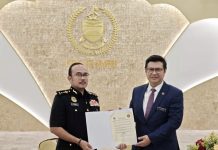KOTA KINABALU: The Liberal Democratic Party (LDP) Secretary General Datuk Chin Shu Ying today firmly calls on the Sabah State Government to emulate Sarawak’s decision to retain the youth age definition at 40 years and to reject the federal government’s move to lower it to 30 years starting 1 January 2026.
Sarawak’s Minister for Youth, Sports and Entrepreneur Development, Datuk Seri Abdul Karim Rahman Hamzah, has made it clear that Sarawak will not follow the federal redefinition. Instead, it will maintain its current policy, recognising youths as individuals aged between 15 and 40 years old.
This position by Sarawak not only reflects the state’s constitutional autonomy over youth matters under the Concurrent List but also demonstrates a sound understanding of its own social, economic, and developmental context.
Datuk Chin Shu Ying believes that Sabah, which shares similar socio-economic structures, rural challenges, and cultural values with Sarawak, must assert its own rights to decide youth policies that reflect its people’s realities—not simply follow top-down federal directives.
In Sabah, many individuals only begin to settle into their careers, complete their education, or start families in their early to mid-30s. For them, the ages between 30 and 40 are a critical phase of personal growth, leadership development, and contribution to society.
Reducing the youth age limit to 30 would result in the exclusion of these individuals from youth-related opportunities, including funding schemes, leadership roles in youth organizations, training programmes, and public engagement platforms.
Such exclusion would not only hinder their development but also destabilize many existing youth organizations in Sabah, especially in rural and indigenous communities where age-based mentorship and intergenerational continuity are essential.
He emphasizes that youth development is not simply about chronological age—it is about capacity building, empowerment, and readiness. Prematurely capping this group’s access to support and participation could stunt Sabah’s long-term human capital growth.
Sarawak’s implementation of a flexible model—where 70% of youth leaders are between 18 and 40 years old, and 30% may be older—offers a pragmatic and inclusive formula. He believes Sabah should adopt a similar approach to balance renewal with continuity.
Sabah has every constitutional right to chart its own course in youth affairs. The Federal Constitution provides states with concurrent authority on youth matters, and like Sarawak, Sabah should act in the best interests of its people.
In indigenous and rural Sabahan societies, individuals aged 30 and above are still regarded as young, active, and deeply involved in local leadership. Their roles are indispensable in preserving culture, guiding younger generations, and stabilizing community networks.
Datuk Chin warns that blindly adopting a West Malaysia-centric model risks weakening the foundation of Sabah’s community leadership and excluding a generation still in transition. Good governance must be rooted in local adaptability—not rigid standardisation.
Therefore, He proposes three key actions. First, the Sabah Government should publicly reaffirm its decision to retain the youth age limit at 40. Second, it should consider adopting a flexible leadership quota similar to Sarawak’s. Third, it should initiate a consultation process involving youth organizations, indigenous groups, and experts to draft a Sabah-specific Youth Development Blueprint.
The State Legislative Assembly should also table this issue for debate, allowing all stakeholders to present data, views, and on-the-ground experiences. Policy should not be formulated in isolation but with open, inclusive dialogue.
Datuk Chin is committed to supporting the process. We will prepare a detailed memorandum backed by research and field feedback to submit to the state government, ensuring that the future of youth in Sabah is protected by evidence-based, inclusive, and sustainable policies.
Finally, he strongly reaffirms its belief that age should not become a barrier to participation or progress. Sabah must stand firm, alongside Sarawak, in defending a youth policy that reflects its people’s realities and protects every young Sabahan’s right to grow, lead, and contribute.-prBNN






